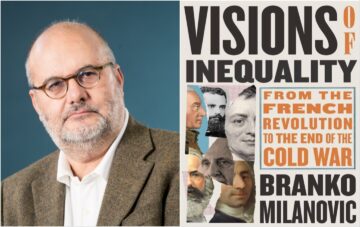Daniel Steinmetz-Jenkins in The Nation:
 Branko Milanović’s Visions of Inequality: From the French Revolution to the End of the Cold War is an intellectual history of how leading economists since the 18th century, from Adam Smith to Karl Marx and beyond, have thought about income distribution and inequality.
Branko Milanović’s Visions of Inequality: From the French Revolution to the End of the Cold War is an intellectual history of how leading economists since the 18th century, from Adam Smith to Karl Marx and beyond, have thought about income distribution and inequality.
Milanović, an economics research professor at the CUNY Graduate Center, seeks to explain why studies on inequality suffered a drastic decline during the Cold War, only to return with a vengeance over the last decade or so. His answer suggests that during the Cold War, the ruling elites of both the United States and the Soviet Union sought to deny class differences under their respective regimes, in order to promote the superiority of their own ideology against their rival’s. Yet, despite the US victory in the Cold War and the collapse of the Soviet economic system, inequality has not only persisted in the West but grown in the last few decades.
This increasing disparity confounds the attempts by Cold War liberals to downplay or mask the realities of expanding economic inequality.
More here.
